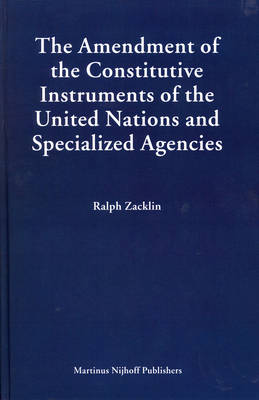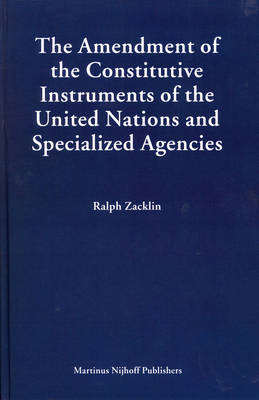
- Afhalen na 1 uur in een winkel met voorraad
- Gratis thuislevering in België vanaf € 30
- Ruim aanbod met 7 miljoen producten
- Afhalen na 1 uur in een winkel met voorraad
- Gratis thuislevering in België vanaf € 30
- Ruim aanbod met 7 miljoen producten
Zoeken
The Amendment of the Constitutive Instruments of the United Nations and Specialized Agencies
Ralph Zacklin
€ 274,95
+ 549 punten
Omschrijving
'The amendment of international treaties raises problems which are closely linked to the issue of stability and development in the international juridical order. The author of the present work successfully relates these problems, which are of crucial importance in all juridical systems, to the more particular problems connected with the constitutions of international organizations of universal scope. As the effectiveness and continuity of international organizations depend to no small extent on their ability to adapt themselves constantly to a rapidly evolving world, the necessary flexibility must be ensured by provisions included in the constitutions of the organizations. The juridical tool used to meet these needs is an amendment clause incorporated in the constitutive instrument.'
The above-mentioned text from the Foreword by Paul Guggenheim written in 1967 is still as valid today in the light of the reform proposals emerging from the work of the High-Level Panel and the Report of the Secretary General 'In Larger Freedom' which are currently the subject of intense negotiations around the Charter of the United Nations, and in particular Articles 108 and 109. This reprinted edition will be of great value to those involved in the reform negotiations as well as to those studying international organizations.
The above-mentioned text from the Foreword by Paul Guggenheim written in 1967 is still as valid today in the light of the reform proposals emerging from the work of the High-Level Panel and the Report of the Secretary General 'In Larger Freedom' which are currently the subject of intense negotiations around the Charter of the United Nations, and in particular Articles 108 and 109. This reprinted edition will be of great value to those involved in the reform negotiations as well as to those studying international organizations.
Specificaties
Betrokkenen
- Auteur(s):
- Uitgeverij:
Inhoud
- Aantal bladzijden:
- 236
- Taal:
- Engels
- Reeks:
- Reeksnummer:
- nr. 45
Eigenschappen
- Productcode (EAN):
- 9789004148000
- Verschijningsdatum:
- 23/09/2005
- Uitvoering:
- Hardcover
- Formaat:
- Genaaid
- Afmetingen:
- 155 mm x 235 mm
- Gewicht:
- 492 g

Alleen bij Standaard Boekhandel
+ 549 punten op je klantenkaart van Standaard Boekhandel
Beoordelingen
We publiceren alleen reviews die voldoen aan de voorwaarden voor reviews. Bekijk onze voorwaarden voor reviews.








